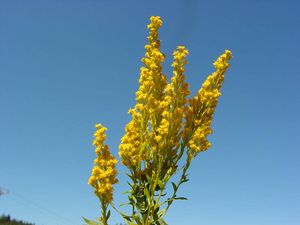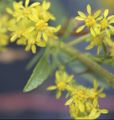- Scientific Name: Solidago missouriensis
- Family: Asteraceae
- Common Name: Missouri goldenrod
- Codon: SOLMIS
Contents
Taxonomy
| Scientific classification | |
|---|---|
| Kingdom: | Plantae |
| Subkingdom: | Viridiplantae |
| Phylum: | Tracheophyta |
| Subphylum: | Spermatophytina |
| Class: | Magnoliopsida |
| Subclass: | Asteranae |
| Order: | Asterales |
| Family: | Asteraceae |
| Genus: | Solidago L. |
| Species: | Solidago missouriensis Nutt. |
| Synonyms | |
| |
Description
Glabrous perennial from a creeping rhizome, 2-9 dm. tall.
Leaves tending to be triple-nerved, the basal ones oblanceolate, up to 30 cm. long and 3 cm. wide, the others smaller and becoming sessile upward.
Flowers arranged in long narrow panicles. Involucre 3-5 mm. high, pseudanthium made up of 7-13 ray florets and 8-13 disk florets, yellow.[2][3]
Bloom Period
Late June-October[2]
Distribution
East Cascades, and rarely on prairies on west Cascades, central BC to Oregon, east to Rocky Mountains, Great Plains, and Midwest.[4]
Habitat
Rather dry, open places, from the valleys and plains to fairly high elevations in the mountains.[4]
Uses
Gregory L. Tilford writes that the species within the Solidago genus may be used more or less interchangeably. He writes the greens can be eaten a cooked potherb, with variable palatibility, and the flowers make a nice sweetened tea. Dried leaves and flowers may be used as a styptic agent, and an infusion to reduce mucus production in the bronchi during a cold or flu. The tea is diuretic and regarded by him as a kidney tonic.[5]
Propagation
Plants established by seedlings can be started by sowing seed in containers in January and placed in a greenhouse. Seed should be covered lightly with soil and kept moist until germination. A layer of pea gravel can be applied to the soil surface to prevent seeds from floating. Seeds planted in this manner will begin germination about Day 7 and complete germination by Day 14. [6]
Photo Gallery
References
- ↑ Integrated Taxonomic Information System. Retrieved from https://www.itis.gov/servlet/SingleRpt/SingleRpt?search_topic=TSN&search_value=36277#null
- ↑ 2.0 2.1 WTU Herbarium, Burke Museum, & University of Washington. Retrieved from https://biology.burke.washington.edu/herbarium/imagecollection/taxon.php?Taxon=Solidago%20missouriensis
- ↑ Bowcutt, F., & Hamman, Sarah. (2016). Vascular plants of the South Sound prairies (First ed.). Olympia, Washington: The Evergreen State College Press.
- ↑ 4.0 4.1 Hitchcock, C. L., Cronquist, A., Giblin, D., & Legler, B. et al. (2018). Flora of the Pacific Northwest: an illustrated manual. Seattle: University of Washington Press.
- ↑ Tilford, G. L. (1999). Edible and medicinal plants of the west. Missoula, MT: Mountain Press Pub. Co.
- ↑ Skinner, D. 2004. Propagation protocol for production of container Solidago missouriensis Nutt. Plants; USDA NRCS Plant Materials Center, Pullman, WA.






